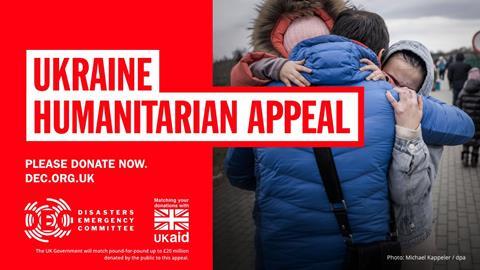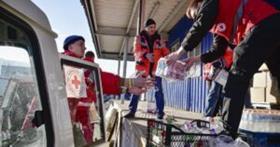
The Humanitarian Logistics Association (HLA) has launched an awareness campaign with its Lyon-based corporate member Bioport to assist those wishing to donate to the Ukrainian refugee crisis. The new guidance gathers the latest best practice from a range of sources to ensure the right donations get to the right people at the right time.
“An on-going challenge of any humanitarian crisis is managing the influx of donations,” explains Sarah Schiffling, senior lecturer in supply chain management at Liverpool Business School and a trustee of the HLA. “Where donations are unsolicited and uncoordinated it can create a burden on the relief effort, and our guidance is intended to assist those seeking to donate and ensure their efforts do not go to waste.
“It is clear that donated goods have a part to play in meeting the needs of any humanitarian crisis, particularly where the local market cannot supply them, but there is a balance between donated goods, local procurement, and cash support. In Ukraine right now, there is a shortage of certain medical items, but these are not owned by the public and must be ordered from specialist suppliers.
“Monetary donations remain the most efficient way to help.”

Schiffling started out in aerospace, getting her first degree in aviation management before working for Kuehne + Nagel. She went on to get her masters working with Rolls Royce but then had a “quarter life crisis” and started to re-evaluate her contribution to the world good.
“Working in logistics I was a commercial person – it was not like I’d studied medicine or something useful,” she reflects. “Then I came across the HLA and realised logistics really helped people in urgent need. I had skills I could apply so now I have a PhD in humanitarian logistics and teach at John Moores University in Liverpool as well as being an international research fellow at the Humanitarian Logistics Research Institute in Helsinki and a trustee of the HLA.”
The HLA is a not-for-profit membership organisation, established in 2009, that seeks to assist the logistics sector in delivering aid. It plays a coordinating role rather than collecting and distributing aid or operating transport and storage services itself. While the HLA is based in the UK it has members from around the world.
“We offer support and connections for people working in logistics functions, both at head office level and on the ground where we have been establishing a lot more connections in recent years,” says Schiffling. “We try to connect people, share best practice and do some research in specific areas.
“One of the things we are focused on is local procurement, particularly in light of Covid, so do we need to use this old-fashioned aid model of packing a big airplane in the US or Europe and sending it to the hotspot of the moment? Can we invest more in buying locally and supporting local economies so maybe we don’t need to be flying plastic buckets around the world because in most countries we can buy plastic buckets somewhere.”
The refugee crisis created by the conflict in Ukraine has dominated the headlines in recent weeks and the immediate response among several transport firms in the UK has been to organise direct shipment of donations to countries bordering Ukraine. But Schiffling warns that this approach needs careful thought if the effort is not to be wasted.
“It is lovely of people to do this, and every school and football club seems to be collecting something,” she says. “But it needs to be considered all the way through so collecting something is only the first step. A lot of people are very happy if they can find a truck to take it to Poland but what happens at the other end? Any logistician will know that you need a consignee to receive it and who is expecting a particular shipment at this particular time rather than showing up randomly with a lorry load of donations.
“Have they got the warehousing space and distribution structure? Unfortunately a lot of things do not get distributed and it is very difficult to match up supply and demand. These are issues that a lot of people organising these collections do not consider when they feel inspired by the media headlines to do something.
“There is a lot of waste and a lot of things do not reach the people in need.”
The other big consideration is to make sure that what is being collected and shipped out actually meets the needs of the intended recipients. This may sound far-fetched by Schiffling says completely inappropriate items like high-heeled shoes often turn up in humanitarian donations.
“People collect things that they think people might need without putting too much thought into it,” she says. “We often see lots of red high-heeled shoes showing up at every disaster! Do people really think that the first need of women fleeing Ukraine with their children is some nice heels?”
Time delays can also mean that well-meaning donations arrive too late.
“If people hear that refugees in say Romania need warm socks then they start their local primary school collecting socks,” says Schiffling. “But in two weeks by the time the collection has finished things will have moved on and a major retailer might already have sent lorry loads of surplus stocks of winter socks. So by the time we start our collections the need has probably been met.
“People think that there is so much need that obviously whatever they send will be used. But what we’re seeing with Ukraine right now is that there is so much congestion particularly on the border with Poland. We have all seen the pictures of huge mounds of clothing sitting out in the rain which is a waste.”
Shipping large quantities of secondhand clothes to disaster zones can also have the unintended consequence of damaging the local retail sector. “If people get clothing for free why would they go to a shop and buy clothes?” Schiffling asks. “That is where humanitarian aid has got it wrong in the past. We want sustainable change not just a sticking plaster.”
So the HLA is now urging people who want to help to raise cash for organisations such as the Disaster Emergencies Committee (DEC) rather than collect and send donated items. This speeds up the process and supports the local economy by, for example, buying warm socks locally instead of transporting them thousands of miles.

“The humanitarian sector is moving away from giving people things towards investing in cash aid for refugees to spend on what they need right now,” says Schiffling. “That is also better for their dignity as they can make their own decisions rather than being handed something. These people have often lost their homes and everything so when they are coming across a border it is a great thing to be able to take care of their own family rather than depending on other people.”
While there is no immediate requirement for road transport on the Ukrainian border as yet, Schiffling urges logistics firms not to forget about the problems the country will face once the conflict is over and the headlines move on to another news story.
“If somebody is eager to help, give it some time because this is going to take time and to have a sustained response can be difficult,” she says. “After a few weeks when the media is not that interested any more can be when we need more support.”
Aid agencies are always looking for skilled logistics professionals willing to volunteer in disaster areas but again Schiffling urges people not to jump on a plane and turn up expecting to be welcomed with open arms.
“The Red Cross for example has a roster so if you want to volunteer and help you can get onto a roster,” she says. “When there is a need for logisticians in a particular area you can go on a rota which also ensures continuity. It might be a great thing to take two weeks annual leave and go out to help – but what happens after those two weeks? Is that warehouse you were running just going to sit empty?”
Schiffling also urges people in the UK not to focus entirely on Ukraine as other long term humanitarian crises around the world have not gone away.
“We often see that with the media focused on a big disaster,” she says. “A lot of donations are earmarked for specific responses such as the Ukraine response fund. Yes a lot is still needed there but there are a whole bunch of other crises as well – Yemen, South Sudan, a developing famine in parts of Kenya and Somalia, Myanmar… there are lots of things happening all over the globe.
“The huge worry is that Russia and Ukraine are big providers of food and if that drops away then food aid for people in crisis is going up in price.”
- The HLA has created a Ukrainian response page on its website to provide more information on what people in the logistics sector can do. This includes a link to Logistics Aide Ukraine, an online forum where people with donations can request transport.













